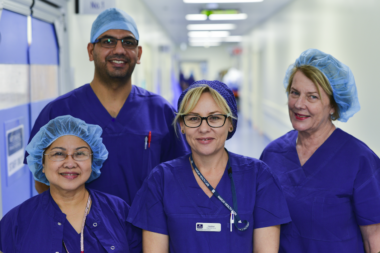The Leukaemia Foundation debunks the biggest myth surrounding one of Australia’s deadliest cancers to help save more lives.
Today is World Leukaemia Day and the Leukaemia Foundation is urging all Australians to do one simple action…educate themselves on who it impacts.
Latest figures show more than 5,300 Australians will be diagnosed with leukaemia this year[i], with this number set to more than double by 2035[ii].
Furthermore, 1,682 Australians will sadly lose their life to the disease[iii], with leukaemia continuing to rank as one of Australia's most prevalent and deadly cancers.
According to the Leukaemia Foundation, however, with incidence high and awareness low[iv], the biggest myth surrounding leukaemia is that it’s predominantly a cancer among children – a fact the CEO, Chris Tanti, is aiming to set straight today.
“Like all blood cancers, leukaemia does not discriminate, and it does not only impact children and young adults,” said Mr Tanti.
“It’s quite the opposite. It can impact anyone, at any time, and at any stage of life, from newborns to adolescents, young adults to working adults with families, and older Australians.
“But the cohort who it disproportionately affects the most, is in fact, those over the age of fifty.
“The latest research clearly shows a significant rise in cases in older Australians with the median age of those diagnosed with leukaemia now being 70 years old[v] – a statistic bound to surprise many people.”
As Australia’s population continues to age, the Leukaemia Foundation warns the burden of leukaemia will be felt more than ever, with older Australians identified in the Australian Cancer Plan as a community with significantly poorer outcomes when it comes to a cancer diagnosis.
“Latest statistics show the projected number of deaths from leukaemia in those aged fifty and over is estimated to be more than 1,570 people this year[vi],” said Mr Tanti.
“When you compare this figure to those under the age of 50, there is a considerable difference with 107 deaths predicted in this age group[vii].
“Of course, even a single death is one too many, but it is clear leukaemia, like every type of blood cancer, is a cancer more greatly impacting older generations.”
Along with those living regionally, First Nations peoples, culturally and linguistically diverse communities, and LGBTQIA+ individuals, the Leukaemia Foundation recognises older Australians also face barriers in getting a timely cancer diagnosis or receiving the best possible treatment and supportive care.
New YouGov data commissioned by the Leukaemia Foundation additionally showed age as one of the biggest worries of Australians when it comes to a cancer diagnosis, only second behind the cost of treatment[viii].
“More than half of Baby Boomers we recently surveyed greatly fear a cancer diagnosis[ix] and it’s no wonder when you look at the impact of blood cancer on this age group.
“Also unsettling, is that they also fear age discrimination during treatment, with four in ten Baby Boomers reporting this as something that worries them[x].”
These insights are helping to inform the Leukaemia Foundation on how to better support and educate older Australians who are most at risk of a blood cancer diagnosis like leukaemia.
The Leukaemia Foundation’s new campaign, A Fair Go, aims to address the uncertainty around blood cancer, so that all Australians, regardless of their age or background, have the knowledge, resources and support they need to face a diagnosis head on.
“We firmly believe that age should not be a barrier to Australians receiving the best possible treatment, care, and support throughout their blood cancer experience, especially given leukaemia predominantly impacts older Australians.
“Everyone deserve a fair go when it comes to surviving blood cancer, and we are intent on addressing the issues faced by older Australians and educating and informing them about blood cancer, to help ease their fears and support them when they need it most.”
The Leukaemia Foundation also stressed the importance of all Australians, especially those aged fifty and over, to be aware of the signs and symptoms of blood cancer as it could save their life.
“The earlier that someone is diagnosed with a blood cancer like leukaemia, the higher the likelihood of them being able to access the best possible treatment and care.
“And knowing the signs and symptoms is one of the biggest indicators of a timely diagnosis.
“We urge anyone experiencing recurrent infections, increased fatigue, night sweats, bone pain, unexplained weight loss, bruising or enlarged lymph nodes, to see their GP or specialist immediately – every minute counts in the race to beat blood cancer.”
This World Leukaemia Day, the Leukaemia Foundation encourages all Australians affected by leukaemia and any blood cancer, or those interested in finding out more, to go to bloodcancer.org.au.
-END-
[iv] Blood Cancer Access and Equity – AU, YouGov 2024
[viii] Blood Cancer Access and Equity – AU, YouGov 2024
[ix] Blood Cancer Access and Equity – AU, YouGov 2024
[x] Blood Cancer Access and Equity – AU, YouGov 2024
About us:
About the Leukaemia Foundation: The Leukaemia Foundation stands with Australia to help cure and conquer blood cancer – with care. Together we are attacking every blood cancer, from every direction, in every way we can. We stand beside every Australian to be their voice and their someone-to-turn to, fighting to get them access to the best care. We also accelerate research that is delivering rapid advancements in blood cancer diagnosis and treatments. Plus, we provide services and support that empower people living with any blood cancer to live well after diagnosis. You can learn more about the Leukaemia Foundation and blood cancer at leukaemia.org.au
Contact details:
Please contact Prue Cripps, PR Manager at Leukaemia Foundation via [email protected] or 0473 154 079.


